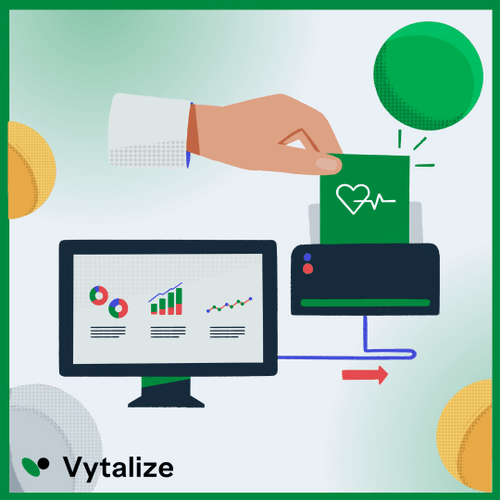 There is a significant transformation taking place in the way we deliver healthcare, and it is being largely driven by technology. Big Data, cloud computing, and mobile health apps, among many others, will soon be transforming underlying service delivery models as well. This dynamic becomes all the more important when we take into consideration the catalyzing effect of the COVID-19 pandemic, during which the importance of technology has been dramatically emphasized and prioritized. Health organizations are beginning to recognize the impact of digital change on how patient care is delivered in conjunction with interoperability. The beauty of an entire US healthcare system that is digital and integrated would be one to behold, and it would lead to improved care across the board along with superior patient outcomes.
There is a significant transformation taking place in the way we deliver healthcare, and it is being largely driven by technology. Big Data, cloud computing, and mobile health apps, among many others, will soon be transforming underlying service delivery models as well. This dynamic becomes all the more important when we take into consideration the catalyzing effect of the COVID-19 pandemic, during which the importance of technology has been dramatically emphasized and prioritized. Health organizations are beginning to recognize the impact of digital change on how patient care is delivered in conjunction with interoperability. The beauty of an entire US healthcare system that is digital and integrated would be one to behold, and it would lead to improved care across the board along with superior patient outcomes.
Technology has not only transformed the way we deliver healthcare, but it has also allowed the system to become more efficient and cost-effective for consumers as well as providers. Ultimately, greater technological innovation is needed to ensure the sustainability of accountable care models. The development and promotion of evidence-based medicine include the need for an infrastructure that allows Accountable Care Organizations (ACO) to collect and evaluate data, provide feedback to ACO participants, and influence the care of the organization members.
 We frequently hear about innovative business models, customer involvement, cost reductions, and data analysis in the context of digital change and the introduction of the Internet of Things in healthcare. New digital technologies can improve outcomes, reduce costs, improve patient and provider experience, and provide real added value. It is believed that healthcare systems, provided the right strategic thinking, can help consumers with the integrated and seamless experience they expect and deserve from other industries.
We frequently hear about innovative business models, customer involvement, cost reductions, and data analysis in the context of digital change and the introduction of the Internet of Things in healthcare. New digital technologies can improve outcomes, reduce costs, improve patient and provider experience, and provide real added value. It is believed that healthcare systems, provided the right strategic thinking, can help consumers with the integrated and seamless experience they expect and deserve from other industries.
Current contributions to health IT provide a starting point for meeting the basic technical requirements that need to be met to some extent. For example, existing hospital information systems (e.g. Electronic Medical Records) and Health Information Exchange (HIE) systems have the necessary functionality to support the management and operation of clinical objectives. Most current technologies are designed to capture patient care information about episodes of care, not time constraints, care settings, or organizational boundaries.
In contrast, the success of the ACO model depends on the development of end-to-end technologies that support the electronic exchange of clinical information and longitudinal data, coordination of care in acute outpatient settings, and reporting on payment distribution and data collection to measure progress toward these goals. The purpose of the ACO model is to facilitate coordination of care, enable patients to receive the proper treatment at the right time, and reduce the risk of medical errors and duplication of services.

While provider groups have been practicing some form of accountable care for decades, recent health reform laws have catalyzed hundreds of other providers to move to accountable care models. Some healthcare systems are improving their offerings with a renewed focus on patient experience, virtual care, price transparency, and applications. While others seek partnerships with companies they disrupt to maintain referrals and specialized downstream services. It remains to be seen whether these new providers will disrupt hospital-based care models and whether they will support or impede efforts to reach the triple goals of quality, access, and affordability for health care consumers.
Consumers want convenient, high-quality, and affordable care, which is the aim of digital solutions such as online booking and tele-medical support. They also want solutions that analog healthcare can’t provide, including tools they can use independently to care for themselves and their loved ones at home and help them navigate the healthcare system.
ACOs are groups of physicians, hospitals, and other healthcare providers that have come together to provide coordinated, high-quality care to Medicare patients they serve. These models are held in the ideal context of the rise of digital health tools. ACOs are part of a broader concept of population health management that aims to improve patient engagement, clinical competence, and costs. The idea behind ACOs is that providers should be incentivized to improve their patient’s health by providing more services while lowering the cost of care. ACOs are an important business model in today’s value-driven care environment as they strive to deliver quality, efficiency, and better outcomes to patients.
New innovations are on the horizon, as they always have been, and technologies such as Artificial Intelligence and wearables will soon change the face of healthcare forever. With all eyes set on value-based care, as opposed to fee-for-service, ACOs will not only play a bigger role in the near future, but they will also likely take a larger chunk of the healthcare responsibility as they continue to succeed and streamline. Value-based care makes intuitive sense not just for the USA, but for the entire world, and ACOs are the crucial protagonists in this healthcare/business model.
Contact Vytalize today to learn how we equip practices with the data needed to improve patient outcomes!






